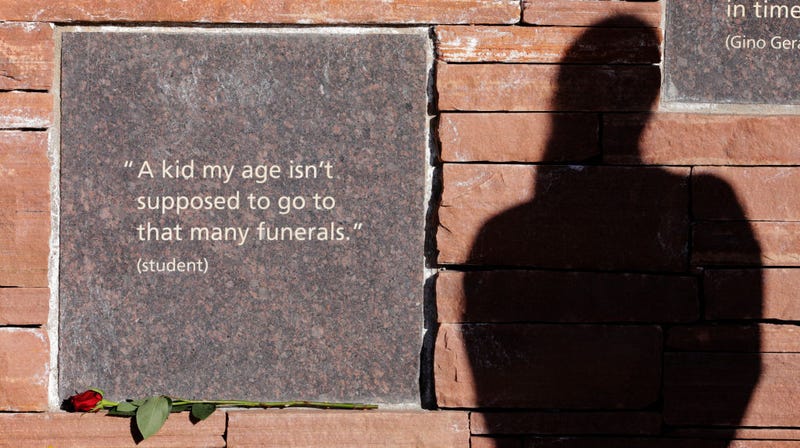
As the U.S. marks the 25th anniversary of the Columbine High School massacre this week, there is a trend online that apparently glorifies shooters Eric Harris and Dylan Klebold.
Per the Federal Bureau of Investigation, Harris and Klebold killed 12 of their classmates at the Littleton, Colo., high school on April 20, 1999, and then died by suicide. Sandy Hook Promise – a group established after the 2012 Sandy Hook Elementary School shooting in Connecticut – said that the tragedy at Columbine is “considered by many as the unofficial start of the gun violence prevention movement in the U.S.”
Indeed, school shootings in Florida, Texas, Virginia and more have made headlines since Columbine. According to a study published by the American Academy of Pediatrics last month, there were 1,453 school shootings from the 1997-1998 school year through the 2021-2022 school year and “the most recent five school years reflected a substantially higher number of school shootings than the prior 20 years.”
When Harris and Klebold were planning their massacre, the internet was much different than it was today.
“At the time, Google was still a startup. Facebook, the iPhone and YouTube had not yet been invented,” USA Today explained. “Yet 25 years later, the traces left online by Eric Harris and Dylan Klebold have not faded into the obscurity of the early web.”
These traces have sparked an “obsessive online interest among a generation that wasn’t even alive at the time of the attack,” said the outlet. It is an interest that actually “flourishes via online algorithms that amplify edgy or hate-fueled content, researchers say – and via social media platforms that prioritize audiences and profits over finding and removing violent and damaging content.”
Audacy has already reported on some cases of internet-related Columbine obsession gone violent.
In 2019, 18-year-old Miami Beach high school student Sol Pais was allegedly on the run after making threats that led to the closure of Denver-area schools, per WCBS. She reportedly became “infatuated” with the Columbine school shooting and posted about it in an online journal.
Last year, KRLD reported on the arrest of 22-year-old Noah Robert Calderon, who detonated a homemade bomb in a residential neighborhood.
“The Justice Department says Calderon shared images of handmade explosives on social media. They say their investigation also shows that Calderon embraces white supremacist ideology and is fascinated with mass shootings, like the one at Columbine High School in Colorado in 1999,” according to KRLD.
Earlier this year, The Des Moines Register reported that 17-year-old Dylan Butler, the student identified as the Perry High School shooter, posted a photo on the social media site TikTok accompanied by the song “Stray Bullet” by KMFDM.
“The song infamously was used on the personal website of Eric Harris, one of the shooters of the Columbine High School massacre in 1999,” said the Register.
According to USA Today, a “dark subculture,” has grown around the Columbine shooters, based on the remnants of their online lives.
“Today, researchers track social media, video sites and gaming platforms, where they find a cult of Columbine thriving among young internet users,” it said. This includes TikTok profiles with the shooters’ names and photos alongside hearts and ribbons as well as first-person shooter simulations. Fans of the shooters even “declare their love and admiration in the comments,” it said.
A cultural fascination with killers isn’t limited to the Columbine shooters. Last November, Boston University dove into the nation’s obsession with serial killers.
“Our media environment is especially well-suited to creating celebrity and sustaining that celebrity,” said Deborah Jaramillo, a College of Communication associate professor of film and television studies, who teaches a COM course on true crime media. “[We have] this idea of the celebrity criminal, and serial killers kind of turn into celebrities.”
Anne Marie Hochhalter, who was shot and paralyzed during the Columbine attack, told USA TODAY that social media companies are “raking in the money,” and doesn’t believe they have done enough to eliminate violent content from their platforms.
“Our fascination with serial killers is part of a broader tendency that humans have to be intrigued by dangerous situations,” said Coltan Scrivner Ph.D. in a piece for Psychology Today.
“It is not just individuals who find murders fascinating,” said Rachel Moore in a 2019 piece for The Guardian about people who developed an obsession with Columbine. “Periodically, the culture at large will fixate on a certain crime or grant a murderer celebrity status. These collective obsessions are often dismissed as exploitative, sensationalistic and distasteful. But the murder stories we tell, and the ways that we tell them, have a political and social impact and are worth taking seriously.”
After growing up in the wake of Columbine and other high-profile shooting incidents (among other factors) Gen Z at large appears to be feeling an impact. An ongoing study presented by Montclair Justice Studies Professor Gabriel Rubin at the 2023 Society for Risk Analysis Annual Conference found that this generation “perceives more dangers in life than previous generations and are fed with a constant stream of news alerts that overemphasize their threat level,” and that this in turn has contributed to anxiety, depression and suicidality.
“There’s this misperception that Gen Z have high incidences of anxiety and depression because they’re overly coddled or too sensitive,” Rubin says. “In the interviews I found that, in addition to the stigma around mental health eroding, Gen Z young people are faced with tremendous pressures and daily concerns that combine to paint a picture of a very dangerous world.”
Anyone who is or knows someone who is dealing with mental health concerns can get help via the Substance Abuse and Mental Health Services Hotline by dialing 988.
